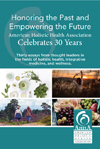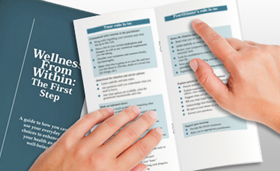American Holistic Health Association
The free, impartial wellness resource connecting you to the power of choice

Special Updates
Reports Archive
The monthly Special Updates from the AHHA are Reports with items of interest to those actively enhancing their health and well-being. Each Report features a health or health freedom issue. It also features a research item and an AHHA resource.
These free Reports are sent out to subscribers. You can have these AHHA Special Updates sent to you personally by signing up online.
The Archives of these AHHA Special Updates Reports are maintained here for those who have not yet signed up to receive them by email and those who wish to review past issues.
April 26, 2024
FEATURED RESEARCH ARTICLE
Intravenous vitamin C for cancer
“A 68-year-old man with stage 4 metastatic pancreatic ductal adenocarcinoma refused conventional treatment and opted for intravenous vitamin C in doses of 75 to 125 g two to three times a week….He survived nearly four years, during which time he received more than 450 vitamin C infusions and had objective evidence of disease regression.” From a Townsend Lette research article, “Treatment of Pancreatic Cancer with Intravenous Vitamin C.”
FEATURED ISSUE
Dietitians’ monopoly?
Reaching the goal of being healthy requires choosing a healthy lifestyle. One of important lifestyle choices involves the nutritional choices you make in what you eat. The professional associations for dietitians and nutritionists have a strong history of seeing that the general public learns about healthy nutrition from a variety of approaches. However, something is currently unfolding that appears to have a disturbing side-effect
Have you heard about the Dietitian Interstate Compact? This is a legal maneuver currently being enacted by the states to make it easier for Registered Dietician Nutritionists (RDNs) to be allowed to practice in multiple states. The concerning side-effect is that it appears to be establishing a professional monopoly for the RDNs to be the providers of nutritional guidance. If this happens, the general public would be deprived of access to nutrition professionals offering other nutritional approaches.
Note that the Academy of Nutrition and Dietetics (AND) is the trade group for RDNs, which is the group of dieticians that has a history of partnering with industries offering junk food. Compare this, for example, with what is offered by Certified Nutrition Specialist® that are certified by the American Nutrition Association.
ISSUE: Will the Dietitian Interstate Compact create a monopoly for Registered Dietician Nutritionists and block out other nutrition professionals?
AHHA strives to maintain a neutral position and views knowledge as power. For those interested in this month’s Issue, a few key articles have been selected to get you started in studying this matter.
Dietitian Licensure Compact
The Council of State Governments
Dietitian License Compact
National Center for Interstate Compacts
Junk Food and Junk Advice (4/11/24)
Alliance for Natural Health
What is the difference between nutritionists vs dietitians? (6/26/23)
Medical News Today
You are also encouraged to go to our blog at ahha.org/blog and post your comments.
FEATURED AHHA RESOURCE
How to find a progressive physician
Are you searching for a medical doctor who delivers care that is more than just drugs and surgery? Check our Holistic Practitioners database. If this does not help you locate such a physician in your geographic area, the Practitioner Referral Sources list is a useful next step. This list includes a wide variety of healthcare modality associations that give referrals, some of which are exclusively for medical doctors. Physicians who are affiliated with the organizations in our databases are definitely the open-minded, progressive ones who have gone beyond drugs and surgery. Where else but with AHHA can you find so many of these special physicians so easily?
March 22, 2024
FEATURED RESEARCH ARTICLE
Neglected heart health factors
“Whether an individual seeks peak exercise performance goals or generalized wellness, quantifying sufficient pulmonary function and competency is of paramount importance.” “Increasing levels of NAD (nicotinamide adenine dinucleotide) through supplementation with NR (nicotinamide riboside) is critical for cardiovascular health and cardiac energy metabolism.” From a Townsend Letter research article, “Novel Ways to Support Cardiac Energetics” by Chris D. Meletis, ND.
FEATURED ISSUE
Vitamin B3 levels controversy
The United States and fifty other countries have for decades fortified flour and cereals with niacin (vitamin B3) because of past research showing that B3 helped to prevent disease related to nutritional deficiency. But new research published in Nature Medicine in February 2024 found that about twenty-five per cent of the study’s participants were designated as developing cardiovascular disease caused by consuming higher levels of vitamin B3.
This research is so new that your family physician may not yet have had an opportunity to study the now conflicting positions in the medical community related to how much vitamin B3 would be optimal for you. Before you do consult with your family physician, therefore, you may want to inform yourself about what is currently known about various vitamin B3 levels, determine how much vitamin B3 is in your daily diet, and look at your heart’s health.
ISSUE: What is the relationship of my heart health and the amount of vitamin B3 I consume?
AHHA strives to maintain a neutral position and views knowledge as power. For those interested in this month’s Issue, only a few key articles have been selected that you are encouraged to study the contents of both viewpoints in detail (rather than skimming). You are further encouraged to stay alert for future studies that will hopefully provide broader and deep research into this aspect of maintaining a healthy heart, and perhaps identifying something else that is involved in triggering the vascular inflammation.
New research changing viewpoint of niacin (vitamin B3) level related to heart health
Cleveland Clinic-Led Study Discovers Link between High Levels of Niacin – a Common B Vitamin – and Heart Disease (2/19/24)
Newsroom of Cleveland Clinic
“Cleveland Clinic researchers have identified a new pathway that contributes to cardiovascular disease associated with high levels of niacin, a common B vitamin previously recommended to lower cholesterol…..The main takeaway is not that we should cut out our entire intake of niacin – that’s not a realistic approach,” said Dr. Hazen. ‘Given these findings, a discussion over whether a continued mandate of flour and cereal fortification with niacin in the U.S. could be warranted.’”
A terminal metabolite of niacin promotes vascular inflammation and contributes to cardiovascular disease risk (2/19/24)
by Marc Ferrell, et. all.
Nature Medicine
“Niacin is an essential micronutrient fortified in food staples, but its role in CVD (cardiovascular disease) is not well understood.”
Hesitancy to adopt new B3 level based on one study
B3 in the crosshairs––should you worry? (3/8/24)
by Dr Ronald Hoffman
Intelligent Medicine
“I, for one, am not ready to jettison my use of B-vitamin containing supplements and NAD-supporting nutrients on the sketchy basis of a single study, no matter how much it’s been uncritically amplified by the media.”
FEATURED AHHA RESOURCE
How do YOU define “holistic”?
Have you discovered that others are not defining the term “holistic” the same way you are? AHHA has always recommended that when you’re talking about holistic concepts, it’s wise to define terms and make sure you and the person you are talking with agree on those definitions. AHHA offers articles on this important topic. See the What is Holistic? category in our Self-Help Articles Collection. Perhaps these articles will also help you clarify your own thinking about what “holistic” really means.
February 23, 2024
FEATURED RESEARCH ARTICLE
Fibromyalgia pain relief
“Fibromyalgia is dramatically increasing in both prevalence and public awareness.” Learn about “a comprehensive protocol to see optimal results…from severe fatigue and widespread pain” in a Townsend Letter research article, “Effective Treatment of Pain and Sleep in Fibromyalgia: A Comprehensive Clinical Approach” by Jacob Teitelbaum, MD.
FEATURED ISSUE
WHO Pandemic Treaty
It appears that the World Health Organization (WHO) is positioning itself to be calling the shots for addressing future health pandemics. This United Nations (UN) health agency is currently refining agreements for the 194 member countries to grant total power to WHO, overriding national and personal health preferences. Final legally binding documents will be voted on in May 2024 at the World Health Assembly in Switzerland.
Some of the key items you may want to track for the Pandemic Treaty and International Health Regulations (IHR) are:
- Requirement for UN member countries to recognize WHO as the guidance and coordinating authority of international public health response during public health.
- Requirement for UN member countries to give WHO binding powers to dictate health policy to member states for medical countermeasures to address a public health emergency.
- If the United States continues to join with those UN member countries calling for the negotiations and drafts of the documents to remain closed to the public.
- If there are penalties if a UN member country does not follow WHO dictates related to health policies.
ISSUE: Might I lose my personal health freedoms when the next pandemic arrives?
AHHA strives to maintain a neutral position and views knowledge as power. For those interested in this month’s Issue, the following articles have been selected so that you can begin to be aware of the possible threats to your future health freedoms. You are encouraged to delve deeper and expand your knowledge of this matter using these articles as a springboard.
From WHO:
International Health Regulations (IHR) (2005)
World Health Organization (WHO)
Article-by-Article Compilation of Proposed Amendments to the International Health Regulations (2005) submitted in accordance with decision WHA75(9) (2022)
World Health Organization (WHO)
Proposal for negotiating text of the WHO Pandemic Agreement (10/30/23)
World Health Organization (WHO)
Comments from other organizations:
Concerns About the WHO Pandemic Preparedness Treaty (10/10/23)
C-Fam Center for Family & Human Rights
Health Freedom Threatened by WHO Power Grab (2/16/24)
Alliance for Natural Health
WHO ‘Pandemic Treaty’ Draft Reaffirms Nations’ Sovereignty to Dictate Health Policy (3/2/23)
by Catalina Jaramillo
FactCheck.org
Why the WHO Pandemic Treaty Threatens Freedom of Expression
by Giorgio Mazzoli
Real Clear Politics
WHO Pandemic Treaty Remains Fatally Flawed (2/5/24)
by Brett Schaefer and Steven Groves
The Heritage Foundation
WHO member states are negotiating a pandemic treaty. But will countries follow the new rules? (2/15/24)
by Elliot Hannon, Nina Schwalbe, Susanna Lehtimaki
Bulletin of the Atomic Scientists
You are also encouraged to go to our blog at ahha.org/blog and post your comments.
FEATURED AHHA RESOURCE
Change a life
Check out the AHHA Gift for a Better Life, a single-sheet flyer that introduces the powerful concept of the holistic approach. It’s available for free!. Who do you know who could benefit from receiving a copy? You can download the flyer and share it by emailing it or hand delivering a printed copy (double-sided). It can empower that person’s life. Note that this flyer is available in both English and Spanish.
January 26, 2024
FEATURED RESEARCH ARTICLE
Essential oils as self-care resource
“Due to their multifaceted properties, essential oils bridge the link between the mind and body. They are synergistic with many integrative and conventional treatments based on their influence on one’s mindset, mood, and biology.” From a Townsend Letter research article, “Mind-Body Applications of Essential Oils: A Case Study of Anxiety” by Sarah A LoBisco, ND, IFMCP.
FEATURED ISSUE
Troubling excessive mortality rates
In your circle of family and friends, how many have died in the last twelve months? Is your real world experience matching the scientific articles that report mortality rates for all age groups as “excessive”? Probable causes for death statistics that are higher than expected are listed, but calculated in a variety of ways, so it is difficult to compare to look for consensus. Plus, articles are highly technical, so they are also not easy for the general public to fully understand.
If you are a take-charge individual and want to learn from these statistics in order to improve your longevity, you might wish to dig through some of the articles with the goal of discovering some gems of data that would be appropriate for you and your physician to incorporate into your prevention program.
ISSUE: Why are mortality rates continuing to be so high in the United States?
AHHA strives to maintain a neutral position and views knowledge as power. For those interested in this month’s Issue, the following articles have been selected so that you can begin to be aware of the troubling excessive mortality rates in the United States. You are encouraged to delve deeper and expand your knowledge of this matter using these articles as a springboard.
Are humans really dying more quickly than expected? (1/12/24)
by Rob Verkerk
Alliance for Natural Health – International
“First, there appears to be a very real — not an imaginary — increase in excess deaths that was apparent throughout 2023 that is almost certainly ongoing into 2024 that is affecting younger people, not the older age groups that were most affected during the early, most lethal phase of the pandemic.
Second, there has been a consistent inability for any of the authors, funders or health authorities, that have been responsible for collating, analysing and publishing the excess mortality data considered here, to reflect on a much wider range of possible contributory factors.”
US Mortality Rates Remain Increasing Long After COVID Pandemic; Why Are Americans Dying So Young? (12/14/23)
by Conelisa N. Hubilla
The Science Times
“Public health agencies have reported that Americans are dying in abnormally high numbers long since COVID-19 waned. Food and Drug Administration (FDA) Commissioner Robert Califf even describes this trend as a catastrophic decline in US life expectancy.
Industry analysts and actuaries predict that excess deaths will continue among people with life insurance through 2030 and will be highest at younger ages. This prediction contradicts normal mortality expectations for a vigorous population with life insurance. The worst is even expected from poorly insured Americans who are afflicted by disabilities.”
The Missing Americans: Unprecedented US Mortality Far Exceeds Other Wealthy Nations (7/14/23)
by Jillian McKoy
Boston University School of Public Health
“Comparing age-specific death rates in the U.S. and 21 other wealthy nations from 1933 through 2021, the authors find that current death rates in the US are much higher than other wealthy nations, and the number of excess U.S. deaths has never been larger.”
Annual numbers of excess deaths in the US relative to other developed countries are growing at an alarming rate (6/13/23)
by Patrick Heuveline
The Conversation
“Rising living standards and medical advances through the 20th century have made it possible for people in wealthy countries to live longer and with a better quality of life. Given that the U.S. is the largest economic power in the world, with cutting-edge medical technology, Americans should have an advantage over other countries in terms of life span and death rates.
But in the last 50 years, many countries around the world have outpaced the U.S. in how fast death rates are declining, as revealed by trends in life expectancy.”
What Is the Cause of Increased Mortality Rates? (9/2/22)
by Dr. Joseph Mercola
The Defender
“As one can see, we have lost 349,000 younger Americans to something besides COVID and non-natural death, during the period from 3 April 2021 to 13 August 2022.
The current rate of mortality in this ICD categorization, is around 5,000 – 8,000 per week … which exceeds most weeks of the COVID pandemic itself (save for the absolute peak periods). By now, if all these mortality excesses were indeed a holdover from COVID-19 itself, they should have already begun to tail off. Unfortunately, they are not only not tailing off, in many cases they are still increasing.”
You are also encouraged to go to our blog at ahha.org/blog and post your comments.
FEATURED AHHA RESOURCE
Do you have any treatment questions?
Perhaps the most important resource created by AHHA is the Treatment Researchers list. This unique list includes organizations whose experts can answer your health questions and research treatment options for any health condition using conventional medicine and/or alternative approaches. If you know of someone dealing with a life-threatening or debilitating diagnosis, it is vital for you to inform him or her of this valuable support option, so that they have a wide range of options to consider.
December 22, 2023
FEATURED RESEARCH ARTICLE
How hope impacts cancer outcomes
“If we re-frame our mind to look at the whole person and the environment for what caused the cancer to develop in the first place, then that’s where all these other factors such as stress, diet, environment, the mind, the spirit, and all other aspects of the patient come into play.” from a Townsend Letter research article, “The Biology of Hope” by Leigh Erin Connealy, MD.
FEATURED ISSUE
Food as Medicine expanding
While health and wellness professionals encourage you to consider the benefits of healthy lifestyle choices, have you noticed segments of the government and academia touting a “Food as Medicine” approach? It is interesting to review the related articles listed below to uncover the ways these latter groups present Food as Medicine and the aspects of it that each selects to focus on and support, question their value, or use what they promote as a springboard to advocate for something somewhat related they also want to promote.
Whatever the impetus, it is exciting to see that there is credible research showing how specific foods can treat or prevent chronic health conditions. Also exciting is learning that there are efforts in the works to have insurance cover the costs of healthy food items so that underserved populations can afford these foods.
But note the concerns expressed by some sources that the Food as Medicine programs are taking effort and funding away from medical research or that it might even end up that the U.S. Food & Drug Administration (FDA) “follows the letter of the law, and the law says if you talk publicly about the simple notion of using a food product as a medicine, that turns it into a drug.”
ISSUE: How well informed am I about what the government and academia are doing with Food as Medicine programs?
AHHA strives to maintain a neutral position and views knowledge as power. For those interested in this month’s Issue, the following articles have been selected so that you can begin to be aware of the various programs under development, particularly if you or a loved one is dealing with a chronic condition related to diabetes, heart, kidney, liver, or hypertension. You are encouraged to delve deeper and expand your knowledge of this matter using these articles as a springboard.
Food as Medicine: A Project to Unify and Advance Collective Action (9/27/23)
Health.gov
‘Food as medicine’ on the table (12/7/23)
by Jerry Hagstrom
Outside Influences
A “Food Is Medicine” Approach to Disease Prevention (11/30/23)
by Alyssa J. Moran, ScD, MPH, RD, Christina A. Roberto, PhD
JAMA Network
‘Food as Medicine’ Concept Starts to Catch On: What to Know (11/21/23)
by Ken Terry
WebMD
New Report Shows Food is Medicine Interventions Would Save U.S. Lives and Billions of Dollars (9/26/23)
Tufts University
‘Food is Medicine’ research is key to chronic disease care (10/12/23)
by Bridget Kuehn
Cornell Chronicle
Food as Medicine: How Providers Are Connecting Patients to Essential Nutrition (1/5/23)
by Amy Buroughs
HealthTech
Food is Medicine (12/7/23)
Alliance for Natural Health USA
FEATURED AHHA RESOURCE
Considering a healthcare career?
More and more people are contacting AHHA for information about a healthcare career that includes the holistic health approach. In response to these queries, AHHA has compiled a special section on our website, Career Research, with considerations and resources to support those researching career options. You can share this resource with friends who may be contemplating a career change to healthcare.
November 17, 2023
FEATURED RESEARCH ARTICLE
Simple lifestyle changes
“Many common conditions can be treated with simple lifestyle changes. Such as—premenopausal women who had at last three urinary tract infections in the previous year, and who reported a daily fluid intake of less than about six cups of water per day, had significant improvement by doubling their water intake.” From a Townsend Letter research article, “Lifestyle Habits That Make a Difference” by Tori Hudson, ND.
FEATURED ISSUE
FDA wants to regulate peptides
Have you been following the current articles on peptides presented by a variety of aspects of the health and beauty industries? Whether you are reading up on wellness, anti-aging, fitness, bodybuilding, or healthier skin, you are probably going to come across that group’s favorite role for peptides.
You may be motivated to do some research to see if this rapidly developing new frontier in disease treatment and prevention might have some benefits for you. If you are, you will discover that a number of these organizations touting peptides are currently raising the alarm that the U.S. Food & Drug Administration (FDA) has initiated drafts of regulations that may ultimately reduce or eliminate access to peptides by you and other healthcare consumers.
As you are doing your own research, you are encouraged to become knowledgeable about what the peptides do and how they might be appropriate to consider for something you are dealing with, plus any areas of concern to keep in mind like upcoming possible changes in availability, et cetera.
ISSUE: Do peptides need FDA regulations?
AHHA strives to maintain a neutral position and views knowledge as power. For those interested in this month’s Issue, the following articles have been selected so that you can begin to be aware of the basic data about peptides and the regulatory concerns being raised. You are encouraged to delve deeper and expand your knowledge of this matter using these articles as a springboard.
What Are Peptides? (5/2/23)
by Jennifer Robinson, MD
WebMD
PRO
Clinical Pharmacology Considerations for Peptide Drug Products (full document) (9/8/23)
U.S. Food & Drug Administration
Clinical Pharmacology Considerations for Peptide Drug Products; Draft Guidance for Industry; Availability (9/11/23) (Comments Close 12/11/23)
Federal Register
FDA issues draft guidance of clinical pharmacology, labeling considerations for peptide drug products (9/14/23)
Regulatory Focus
CON
FDA Targets Peptides (11/9/23)
Alliance for Natural Health
Did the FDA Ban Peptides? No, But Close To It (10/24/23)
Fizzness Shizzness
Have Peptides Just Been Banned In the United States (10/13/23)
by Jacob Ladon
Generation Iron Fitness Network
FDA puts some peptides off-limits (10/6/23)
Alliance for Pharmacy Compounding
FDA Peptides Ban: Latest News & Updates (October 2023)
Eightify
FEATURED AHHA RESOURCE
Options for gifts of health this holiday season
Are you looking for a special holiday gift that will motivate a loved one to pay more attention to their health and well-being? AHHA members have written books and created CDs and DVDs that are filled with tips for improving your health. You can learn more at Health-related Books, CDs, DVDs, Videos and at the Books/ Other Media section of the AHHA Organizational Members’ Self-Help Tools database.
October 20, 2023
FEATURED RESEARCH ARTICLE
Are you absorbing toxins through your skin?
“When assessing the entirety of the exposome that affects human health, it is important to consider the invisible sea of synthetic chemicals being applied to our patients’ bodies every day.” From a Townsend Letter research article, “The Skin as Exposome: An Underappreciated Route of Entry for Toxicants” by Anne Marie Fine, NMD.
FEATURED ISSUE
Online data censorship vs. free speech
Because about 85% of the American public use online sources when looking up health options, it is concerning when it appears that there has been repression of valid health data as “disinformation.” This year (2023) the United States, Canada, United Kingdom, and the European Union all made news with new laws and court rulings related to influencing and regulating of online information sources and social media. These changes are being critiqued for possibly trending toward our loss of freedom of speech and full access to valid health information.
8/25/23: The European Union’s Digital Services Act (DSA) went into effect requiring online companies (with over 45 million monthly users in the EU) to actively police their online and social media platforms.
9/8/23: The U.S. Fifth Circuit Court of Appeals upheld part of a lower court’s injunction banning the White House, Surgeon General, Centers for Disease Control and Prevention (CDC), and Federal Bureau of Investigation (FBI) from influencing social media companies to remove “disinformation,” but left other federal agencies open to continue their censorship activities.
Note that the U.S. Supreme Court has indicated that during the court docket for 2023-24 term it will consider arguments as to whether social media content-moderation restrictions and individualized explanation requirements violate the Constitution.
9/19/23: United Kingdom (U.K.) passed the “Online Safety Bill,” a new law to regulate online content. The bill is presented as taking a zero-tolerance approach to protecting children and making sure social media platforms are held responsible for the content they host.
9/29/23: The Canadian Radio-television and Telecommunications Commission (CRTC) announced that all online streaming services that offer podcasts must register and conform to regulatory controls. This is advancing its regulatory plan to modernize Canada’s broadcasting framework and ensure that online streaming services make meaningful contributions to Canadian and Indigenous content.
If you are someone who relies on online information sources for keeping up with health information, the information given above can serve as an alert for you to pay attention to what is happening in North America, United Kingdom, and the European Union. Note that the World Health Organization (WHO) is collecting power to make the final decision.
ISSUE: Have you experienced what appeared to be repression of valid online health information?
AHHA strives to maintain a neutral position and views knowledge as power. For those interested in this month’s Issue, the following articles have been selected so that you can be aware of details about what is happening in the U.S. and countries impacting the U.S. You are encouraged to delve deeper and expand your knowledge of this matter using these articles as a springboard.
The EU’s Digital Services Act goes into effect today: here’s what that means (8/25/23)
The Verge
Appeals court slaps Biden administration for contact with social media companies (9/8/23)
by Shannon Bond, Natalie Escobar
NPR (National Public Radio)
Justices take major Florida and Texas social media cases (9/29/23)
by Amy L. Howe
Howe on the Court
Britain makes internet safer, as Online Safety Bill finished and ready to become law (9/19/23)
Gov.UK
CRTC takes major step forward to modernize Canada’s broadcasting framework (8/29/23)
Government of Canada
Information Compliance — Bill Passed to Demolish Free Speech (10/11/23)
by Joseph Mercola, DO
Mercola
Global principles for identifying credible health information on social media
World Health Organization
FEATURED AHHA RESOURCE
Unique video blurbs
You are invited to view brief, educational, health-related video clips created by AHHA members in our Self-Help Videos section. These video clips, which give tips on health and wellness, are offered to support your journey toward achieving a higher level of wellness.
September 29, 2023
FEATURED RESEARCH ARTICLE
Relationship between pain and lifestyle
“When it comes to pain there are many who realize that lifestyle plays a part, but the significance of food is generally underappreciated…There are many lifestyle issues that contribute to an increased perception of pain. These include oxidative stress and other things that decrease a body’s resilience.” From a Townsend Letter research article, “Lifestyle, Inflammation, and Food Pain” by Hal S. Blatman, MD.
FEATURED ISSUE
Government’s healthy diet experts & conflicts of interest
Every five years the U.S. government updates the Dietary Guidelines for Americans. Everyone is urged to use these Guidelines in selecting a healthy diet. In January of this year a new advisory committee of industry experts was appointed to be responsible to prepare the 2025 update recommendations.
In past years there have been complaints that many of these experts were financially connected with various elements in the food industry that were hidden conflicts of interest. These conflict-of-interest influences resulted in undeserved favoritism in the final Dietary Guidelines. The U.S. Department of Health and Human Services (HHS) and the U.S. Department of Agriculture (USDA) publicly claim that all members of the Dietary Guidelines Advisory Committee are in compliance with the Federal ethics laws and regulations governing conflicts of interest.
This year these conflict of interest complaints are appearing again. And, again, this year the government claims of no conflict of interest are published. What appears to be different this year is that “Through Freedom of Information Act requests, STAT found that the food industry has worked tirelessly to get friendly ‘experts’ on the 20-member advisory committee.”
The list of experts appointed to the 2025 advisory committee can be found at https://www.dietaryguidelines.gov/2025-advisory-committee.
ISSUE: Are you aware of potential conflicts of interest on the part of experts dictating Dietary Guidelines for Americans?
AHHA strives to maintain a neutral position and views knowledge as power. For those interested in this month’s Issue, the following articles have been selected so that you can actually compare the published bios of the newly appointed individuals against claims of undeclared conflicts of interest and decide for yourself. You are encouraged to delve deeper and expand your knowledge of this matter using these articles as a springboard.
Members of the 2025 Dietary Guidelines Advisory Committee Announced (1/19/23)
U.S. Department of Agriculture
The U.S. Department of Health and Human Services (HHS) Secretary Xavier Becerra and U.S. Department of Agriculture (USDA) Secretary Tom Vilsack today announced the appointment of 20 nationally recognized scientists to serve on the 2025 Dietary Guidelines Advisory Committee.
2025 Dietary Guidelines Advisory Committee Disclosures (updated 3/13/23)
Dietary Guidelines Advisory Committee
All members of the 2025 Dietary Guidelines Advisory Committee are in compliance with the Federal ethics laws and regulations governing conflicts of interest. All Committee members have compiled with the reporting of all necessary financial information under these laws and any resulting recusal requirements.
Federal agencies are obscuring potential conflicts of interest among members of the Dietary Guidelines advisory Committee (5/9/23)
Center For Science in the Public Interest
The federal cabinet agencies charged with publishing the Dietary Guidelines for Americans are obscuring the potential financial conflicts of interest of the committee members whose report forms the scientific basis for the Guidelines.
Health watchdog demands greater transparency on US dietary guidelines amid conflict of interest fears (5/12/23)
Food Ingredients
The CSPI stresses that the list fails to include detailed information about individual relationships between members and the industry, which “doesn’t provide the public with the information it deserves.”
Conflicts of interest among Dietary Guidelines advisers (6/4/23(
Sharyl Attkisson
Sen. Chuck Grassley (R-Iowa) is questioning “serious conflict of interest” among advisers on the government’s newest Dietary Guidelines Advisory Committee named to serve from 2025-2030. Grassley is questioning current disclosures, which fail to connect each reported financial conflict of interest to the specific member it pertains to.
The food industry has tried to stack a key nutrition policy panel with its preferred experts, documents show (9/12/23)
By Nicholas Florko
STAT News
Lawmakers and advocacy groups in recent months have urged the USDA to do a more thorough job in vetting potential conflicts of interest on the committee. Sen. Chuck Grassley (R-Iowa) has called for the entire dietary guidelines process to be halted until the committee’s “conflicts of interest are resolved.”
Nutrition Advice, Brought to You by Big Food (9/21/23)
Alliance for Natural Health USA
An investigation by STAT News has found that an advisory committee responsible for shaping American nutrition recommendations is rife with conflicts of interest. This helps explain why the Guidelines have, for years now, continued to miss the mark on several key health issues that, if followed, would undermine our health.
FEATURED AHHA RESOURCE
Your spiritual self
The holistic, or whole person, approach sees “the whole as more than just the sum of its parts.” This means that the whole of you is an integrated union of your physical, mental, emotional, and spiritual selves. AHHA’s website offers a list of books that can support you in developing a richer connection with your spiritual self. Take a look at the books in the Connecting to Your Spirituality database to find the books that will speak to you.
August 18, 2023
FEATURED RESEARCH ARTICLE
Breadth of DHEA benefits
“When the maladaptive stress responses of illness, pain, or injury have inhibited DHEA production, significantly ill consequences can follow.” “The chronic stress response features continued up-regulation of the hypothalamic-pituitary-adrenal (HP-A) axis and the ongoing inhibition of sex hormones. While the concept of ‘adrenal fatigue’ (academicians always use the quotation marks!) is controversial, adrenal reserve capacity can be depleted and thus, DHEA production would be also.” “With some understanding—and having prepared the patient with desiccated neonatal adrenal cortex to receive DHEA as a farmer fertilizes his fields—correctly dosed DHEA supplementation can be very beneficial.” From a Townsend Letter research article, “DHEA Physiology, Deficiency, and Treatment” by Alan B. McDaniel, MD.
FEATURED ISSUE
Who controls your diagnostic lab test is important
If your personal healthcare includes some alternative lab testing to track what is going on with your health, what continues to be evolving with federal regulations related to the laboratory developed tests (LDTs) will most likely be of interest to you. Currently LDTs are regulated by the Centers for Medicare and Medicaid Services (CMS). For some time, the U.S. Food & Drug Administration (FDA) has been working to have greater control over LDT regulations. After just missing their goal in 2022, the FDA has gone on notice that it is trying again. The specifics for the latest attempt are scheduled to be released this month (August 2023). Are you interested in some support for understanding the pros and cons of who controls LDT regulations?
ISSUE: How can you follow expected FDA proposed LDT changes?
AHHA strives to maintain a neutral position and views knowledge as power. For those interested in this month’s Issue, the following articles have been selected so that you can have a greater understanding of the history of FDA attempts to change LDTs regulations, and a variety of concerns other organizations suggest you look for in the latest changes. You are encouraged to delve deeper and expand your knowledge of this matter using these articles as a springboard.
What is CMS’ authority regarding Laboratory Developed Tests (LDTs) and how does it differ from FDA’s authority?
Clinical Laboratory Improvement Amendments (CLIA) program
[Currently: The Clinical Laboratory Improvement Amendments (CLIA) program regulates laboratories that perform testing on patient specimens in order to ensure accurate and reliable test results. The FDA regulates manufacturers and devices under the Federal Food, Drug, and Cosmetic Act (FFDCA) to ensure that devices, including those intended for use in the diagnosis of disease or other conditions, or in the cure, mitigation, treatment, or prevention of disease, are reasonably safe and effective.]
LDT Reform: If Congress Won’t Do It, We Will, Says FDA (4/18/23)
American Society for Clinical Pathology (ASCP)
[While it may sound like decisive action, the new noises coming from the FDA about taking the LDT reform bull by the horns may be more show than substance, perhaps designed to light a fire under Congress. For one thing, it’s far from clear that the FDA even has the legal authority to regulate LDTs or lab tests in general. The agency has long contended that regulating lab tests is an extension of its authority to regulate medical devices under the Food, Drug, and Cosmetic Act (FDCA). But that theory could be challenged in federal court were the agency to seek to implement LDT regulation on its own without a new legislative mandate from Congress. It’s unclear whether the agency would be willing to risk such a high-stakes legal fight.]
Medical Devices; Laboratory Developed Tests
Office of Information and Regulatory Affairs
[Proposed Rule Stage: This proposed rule would propose to amend the Food and Drug Administration’s regulations to make explicit that laboratory developed tests (LDTs) are devices under the Federal Food, Drug, and Cosmetic Act.]
FDA Announces: Regulations about LDT’s are Coming Very Soon (6/28/23)
Discoveries in Health Policy
[In a dry and brief federal regulations announcement, FDA has formally announced that it plans to issue regulations about LDTs, lab developed tests, very soon. Expect proposed regulations by August 2023.]
FDA moves to restructure LDT regulation through notice of proposed rulemaking and oncology LDT pilot program (7/20/23)
by Bethany Hills. Christopher Mikson. Adam Donat, Margaret Martin, Hilary Hoffman. Jianyuan Hua
DLA Piper
[Potential public policy challenges include arguments that many critical tests are available only as LDTs; that FDA regulation will impede and slow important innovation and patient access; and that other solutions to address FDA’s concerns are available and superior to FDA regulation and oversight of LDTs.]
FDA’s Lab Test Power-Grab Continues (7/20/23)
Alliance for Natural Health USA
[Currently, laboratories have the flexibility to adapt and modify tests based on evolving scientific knowledge and patient requirements. That could all change if the FDA wins.]
FEATURED AHHA RESOURCE
How to find a progressive physician
Are you searching for a medical doctor who delivers care that is more than just drugs and surgery? Check our Holistic Practitioners database. If this does not help you locate such a physician in your geographic area, the Practitioner Referral Sources list is a useful next step. This list includes a wide variety of healthcare modality associations that give referrals, some of which are exclusively for medical doctors. Physicians who are affiliated with the organizations in our databases are definitely the open-minded, progressive ones who have gone beyond drugs and surgery. Where else but with AHHA can you find so many of these special physicians so easily?
July 21, 2023
FEATURED RESEARCH ARTICLE
What do you know about vitamin B12?
“In addition, to energy, vitality and wellbeing, I have seen vitamin B12 shots help some patients with shingles, poor memory, back pain, neurological conditions, chronic fatigue syndrome, fibromyalgia, depression, eczematous neurodermatitis, and other conditions.” From a Townsend eLetter research article, “The Vitamin B12 Shot” by Douglas Lobay, BSc, ND
Search for Evidence-based Research Articles.
FEATURED ISSUE
EPA loophole regulating ethanal-coated seeds
Have you been aware of the ongoing legal battle between the Center for Food Safety (CFS) and the U.S. Environmental Protection Agency (EPA) about pesticide-treated seeds? Since 2017, the CFS has unsuccessfully tried petitioning the EPA to cease allowing the pesticide ethanal to be coated on seeds, instead of being included with other pesticide excluding regulations. There have been many articles documenting ethanal’s harm to humans, animals, and the environment. With new action, the CFS has been joined by the Pesticide Action Network North America in a lawsuit against the EPA “to close the regulatory loophole allowing seeds coated with systemic pesticides (coated seeds) to evade the registration and labeling requirements of the Federal Insecticide, Fungicide, and Rodenticide Act (FIFRA).” With some background information, you will have an easier time understanding what is at stake with this battle.
ISSUE: Can ethanal-treated seeds be fairly regulated?
AHHA strives to maintain a neutral position and views knowledge as power. For those interested in this month’s Issue, the following articles have been selected so that you can get a greater understanding of the arguments supporting each side of the battle. You are encouraged to delve deeper and expand your knowledge of this matter using these articles as a springboard.
Consumer Products Treated with Pesticides
U.S. Environmental Protection Agency
[How Products Treated with Pesticides are Regulated…The term “treated articles” typically refers to items that are treated with an antimicrobial pesticide to protect the item itself.]
Help Stop Pesticide-Treated Seeds from Poisoning the Environment (3/25/19)
Beyond Pesticides
[A review of the literature indicates that 90 to 99% of active ingredient delivered through seed treatments is lost to air, soil, and water –including environmental losses caused by the release of contaminated seed dust during mechanical planting (Wood and Goulson, 2017)]
EPA Responds to Treated Seed Petition (9/28/22)
U.S. Environmental Protection Agency
[EPA does not agree with the petition claims as to the treated article exemption and thus is not granting the petition requests to either interpret or amend the regulatory text for the exemption to categorically exclude seed treated with systemic pesticides from the exemption.]
EPA Refuses to Close Pesticide-Coated Seed Loophole That Kills Bees and Endangered Species (9/28/22)
Center for Food Safety
[“We gave EPA a golden chance and a blueprint to fix a problem that has caused significant harm to people, bees, birds, and the environment — and it stubbornly refused.”]
EPA Breaking the Law to Help Pesticide Companies (6/22/23)
Alliance for Natural Health USA
[Incredibly, the use of pesticide-coated seeds, both in ethanol production and to grow food, is completely legal, and the EPA has refused to regulate these toxic seeds…]
Case 3:23-cv-02714 (5/31/23)
Center for Food Safety and Pesticide Action Network North America vs. U.S. Environmental Protection Agency
[…urged EPA to close the regulatory loophole allowing seeds coated with systemic pesticides (coated seeds) to evade the registration and labeling requirements of the Federal Insecticide, Fungicide, and Rodenticide Act (FIFRA).]
Groups Sue EPA Over Failure to Regulate Insecticide-Coated Seeds (6/1/23)
Center for Food Safety
[Today’s filing follows a 2017 CFS rulemaking petition calling on EPA to close the loophole that allows these coated seeds to evade federal pesticide registration and labeling requirements, which are otherwise required for all insecticides. EPA ignored the petition for years, forcing CFS to sue the agency in 2021 and force an answer through settlement. EPA then finally answered the petition only to deny it. This case now challenges that denial as unlawful.]
EPA sued over pesticide-coated seeds’ ‘devastating impacts’ on US wildlife (6/10/23)
The Guardian
[the EPA has claimed it has already thoroughly studied neonicotinoids and does not need to conduct reviews of the seed.]
Schedule for Review of Neonicotinoid Pesticides (5/4/23)
U.S. Environmental Protection Agency
[The dockets for all the neonicotinoid pesticides are open. EPA’s goal is to review the pesticides in this class in the same timeframe so we can ensure consistency across the class. As EPA completes risk assessments for the neonicotinoids, the Agency will pursue risk mitigation, as appropriate.]
FEATURED AHHA RESOURCE
Your Power of Choice
More and more diseases are being documented as being the result of poor lifestyle choices. AHHA’s booklet, Wellness From Within: The First Step, reminds us of the power of the decisions we make throughout the day. Take time to review the options included in this FREE booklet and choose to change one thing in your everyday routine. Check out the various formats of the booklet, which is available online in English, Spanish, and MP3 format.
June 16, 2023
FEATURED RESEARCH ARTICLE
Healthy lifestyle vital for healthy brain
“Lifestyle considerations play a critical role in our brain’s health and its ability to function well. Some genetic factors can play a role in higher risk of AD [Alzheimer’s disease] onset, so does how we live our lives though maintaining a healthy diet, exercising regularly, maintaining a positive outlook on life, and tending to one’s emotional well-being, including managing excessive anger, resentment, and the effects of chronic stress.” From a Townsend Letter research article, “Underlying Causes and Natural Treatments for Alzheimer’s and Dementia,” by Michael Edson, MS, LAc.
Search for Evidence-based Research Articles.
FEATURED ISSUE
Are new weight loss drugs safe for you?
Latest 2023 statistics indicate that forty percent of Americans are considered obese. It isn’t surprising, therefore, that new products with reports of achieving weight loss (without diet and exercise) are popular news topics. The prescription drug semaglutide (in Ozempic) and the herbal supplement berberine are the two current hottest weight loss news topics, even though they are designated for other purposes. Might there be cause for concern?
Those considering taking semaglutide/Ozempic or berberine are strongly encouraged to first become well informed about these products, particularly in relation to verifying that they would be safe and appropriate for your current health situation. Some key questions to include in your research:
- Is the product presented as beneficial for individuals with a health condition you have? Or would you be using it “off-label”?
- What are the identified negative side effects of the product for individuals with your health condition? Is there any indication what might trigger these side effects?
- Are you confident your physician is knowledgeable about the product?
- Did you consider the personal or professional bias of the author in regard to the opinions offered in an article you read?
- If you do take the product, is it recommended that you discontinue the current treatment you are taking for your health condition?
- Have you been informed what might happen if you take this product for a while, then discontinue?
- To retain the benefits, do you need to take this product for the rest of your life?
ISSUE: Do weight loss drug benefits offset the side effects and financial cost?
AHHA strives to maintain a neutral position and views knowledge as power. For those interested in this month’s Issue, the following articles have been selected so that you can get a sense of the facts as presented by a variety of approaches. You are encouraged to delve deeper and expand your knowledge of this matter using these articles as a springboard.
Is Ozempic the Answer for Your Weight Loss? (5/30/23)
Cleveland Clinic HealthEssentials
7 Ozempic Side Effects to Look Out for When Taking the Type 2 Diabetes Drug (5/24/23)
by Emily Goldman
Prevention
Semaglutide (Subcutaneous Route) Side Effects (5/1/23)
Mayo Clinic
What Happens to Your Body When You Stop Taking Ozempic? (4/13/23)
by Claire Bugos
VeryWellHealth
Does the Advent of New Weight Loss Drugs Render Natural Weight Loss Measures Obsolete? (5/25/23)
by Dr Ronald Hoffman
Intelligent Medicine
What Is Berberine? (1/14/23)
by Amber I. Tresca
VeryWellHealth
TikTok users are calling berberine ‘nature’s Ozempic’ – but is it a fad? (6/11/23)
The Guardian
What is berberine, the supplement dubbed ‘nature’s Ozempic’ on social media? (6/1/23)
by Berkeley Lovelace Jr.
NBC News
What To Know About Berberine: Benefits, Uses and Side Effects (5/22/23)
Cleveland Clinic Health Essentials
FEATURED AHHA RESOURCE
How do YOU define “holistic”?
Have you discovered that others are not defining the term “holistic” the same way you are? AHHA has always recommended that when you’re talking about holistic concepts, it’s wise to define terms and make sure you and the person you are talking with agree on those definitions. AHHA offers articles on this important topic. See the What is Holistic? category in our Self-Help Articles Collection. Perhaps these articles will also help you clarify your own thinking about what “holistic” really means.
May 19, 2023
FEATURED RESEARCH ARTICLE
Best to match probiotic to health condition
“Probiotics appear to be useful for preventing or treating a wide range of health conditions.” From a Townsend Letter research article, “Some Thoughts About Using Probiotics” by Alan R. Gaby, MD.
FEATURED ISSUE
Food industry facing updated nutrition labeling changes
In March, 2023, a U.S. Federal government document stated “Most people in the U.S. do not eat enough fruits, vegetables, dairy or whole grains, and they consume too much saturated fat, sodium and added sugars.” [per U.S. Food & Drug Administration] You may nod your head as you read this statement, agreeing that many people are not making healthy food choices. And as the government’s statement continues with “Poor nutrition plays a key role in chronic and preventable diseases, such as cardiovascular disease, diabetes and obesity,” you probably continue feeling comfortable with this statement. Does it change your comfort level in any way to learn that the two above sentences are in a broader statement proceeded by “Eating patterns in the U.S. do not align with dietary recommendations”? Are you a bit curious as to how the government arrived at these “dietary recommendations”? Particularly, as this total statement is part of updating how these dietary recommendations will be allowed on food packaging labels?
Further research on this matter shows that the government uses the recommendations in Dietary Guidelines jointly published by the U.S. Department of Health and Human Services (HHS) and the U.S. Department of Agriculture (USDA) every five years. Currently, the government is using the Dietary Guidelines for Americans, 2020-2025 edition. Further research explained that these guidelines “represent the consensus produced by a group of qualified experts whose bias and conflicts of interest have been minimized.” Their Consensus Report conveys “agreed-upon recommendations that reflect widely-accepted, objective views of current scientific evidence.”
Keep this in mind as you review any articles dealing with the current unfolding of changes in how the food industry will be allowed to label nutritional value on their packaging. The government’s stated intent is to influence consumers toward healthy dietary patterns.
ISSUE: Are you well-informed about the Federal government’s current approach for encouraging their version of a healthy diet?
AHHA strives to maintain a neutral position and views knowledge as power. For those interested in this month’s Issue, the following articles have been selected so that you can review the official documents involved. You are encouraged to delve deeper and expand your knowledge of this matter using these articles as a springboard.
Government documents
FDA Issues Draft Guidance on Dietary Guidance Statements on Food Labels (3/24/23)
U.S. Food & Drug Administration
Dietary Guidelines for Americans, 2020-2025 edition
U.S. Department of Agriculture / U.S. Department of Health & Human Services
Questions and Answers About Dietary Guidance Statements in Food Labeling: Guidance for Industry: Draft Guidance (March 2023)
U.S. Department of Health & Human Services / Food & Drug Administration
FDA Works to Further Improve Nutrition, Reduce Diet-Related Chronic Disease with Dietary Guidance Statements on Food Labels (3/24/23)
U.S. Food & Drug Administration
PRO
The Food Labeling Modernization Act of 2023
Center for Science in the Public Interest
CON
The Labels On Your Food Are Shielding Lies (4/20/23)
Alliance for Natural Health USA
FEATURED AHHA RESOURCE
Change a life
Check out the AHHA Gift for a Better Life, a single-sheet flyer that introduces the powerful concept of the holistic approach. It’s available for free!. Who do you know who could benefit from receiving a copy? You can download the flyer and share by emailing it or hand delivering a printed copy (double-sided). It can empower that person’s life. Note that this flyer is available in both English and Spanish.
April 21, 2023
FEATURED RESEARCH ARTICLE
Overlooked cause of cardiovascular disease
One possible overlooked cause of cardiovascular disease (CVD) is biotoxicity with heavy metals. A recent review article focused on the role of the massive increases in human exposure to heavy metals.” “While the idea that “heavy metal” accumulation may contribute to CVD may seem obvious to integrative practitioners, it is still novel to cardiology specialists.” From a Townsend Letter research article, “Chelation Therapy in Cardiovascular Disease: An Update on the Science” by Joel Kahn, MD, FACC
FEATURED ISSUE
Is erythritol a dangerous sweetener?
One of the challenges of sticking to a healthy diet is the need for the food to taste good. When you are craving something sweet, are you checking out the various sugar substitutes? Erythritol is an alternative sweetener currently in the news generating very mixed messages.
General erythritol benefits include…
Strong sweetener
Low or zero calories
No bitter aftertaste
Better for dental health
Suitable for diabetics
Can act as an antioxidant
General erythritol concerns include…
Might increase risk of stroke or heart attack
Often sourced from GMO corn
Digestive distress from consuming excessive quantity
Negative when combined with certain other consumables
Some individuals are allergic
You are encouraged to glean the key points in both pro and con articles below to identify which issues are important to you and your health. With such diverse, complex views of erythritol you may end up seeing if one side has the stronger arguments.
ISSUE: Is alternative sweetener, erythritol, a serious danger?
AHHA strives to maintain a neutral position and views knowledge as power. For those interested in this month’s Issue, the following sampling of related articles will get your research started and alert you to a variety of conflicting facts related to erythritol. You are encouraged to delve deeper and expand your knowledge of this matter, using these articles as a springboard.
Pro – Agrees dangerous
The artificial sweetener erythritol and cardiovascular event risk (2/27/23)
by Marco Witkowski, et.al.
Nature Magazine (Abstract of the study referenced in may articles)
Artificial Sweetener Erythritol’s Major Health Risks (3/7/23)
Cleveland Clinic
Erythritol: Is This ‘Healthy’ Sweetener the Real Deal? (3/1/23)
By Josh Axe, DC, DNM, CN
Dr. Axe
Con – Disagrees dangerous
Erythritol — Like Sugar Without the Calories? (4/10/23)
Healthline
New Study Inaccurately Attacks Common Sweetener (3/16/23)
Alliance for Natural Health USA
What Is Erythritol?
By Danny Bonvissute
NOURISH
FEATURED AHHA RESOURCE
Discover new wellness options
AHHA Organizational Member companies offer innovative wellness-enhancing products and services to support your journey to a higher level of wellness. In our online Resource section, check out the PRODUCTS and SERVICES categories of the AHHA Self-Help Tools searchable database.
March 17, 2023
FEATURED RESEARCH ARTICLE
Hope for traumatic brain injuries
“In the treatment of traumatic brain injury, the research suggests that hyperbaric oxygen is the most effective therapy currently available at all levels of severity and all time points in the disease process.” Learn about this and other conditions that hyperbaric oxygen therapy (HBOT) can improve (in some cases, when nothing else does). The Townsend Letter research article, “Effectiveness of Hyperbaric Oxygen Therapy for Traumatic Brain Injury: Interview of Paul G. Harch, MD,” written by Nancy Faass, MSW, MPH, includes compelling original research data, as well as original scans documenting improvement.
FEATURED ISSUE
Fake meat healthy or harmful?
Have you explored the multifaceted fake meat segment of the food industry? If not, you have a most interesting adventure awaiting you with this month’s Issue. You will want to thoroughly read both the pro and con articles to uncover the many aspects of this most complex food offering.
You can uncover the vast spectrum of the meat industry from the animal husbandry approach to the lab-grown, cell-based protein approach, with so many variations in-between. Plus you can learn about new ventures in the early stages of development. Be alert for a case being made about good and bad aspects of each option. You get to make up your own mind as to which points of view shape your personal decision as to whether fake meat is healthy or not for humans and for the planet.
If you are curious about sampling some of the fake meat products, be sure to read the labels for the levels of protein, fiber, sodium, and fat.
ISSUE: How many hard facts do you know about fake meat?
AHHA strives to maintain a neutral position and views knowledge as power. For those interested in this month’s Issue, the following sampling of related articles will get your research started and alert you to a variety of conflicting facts related to the fake meat industry. You are encouraged to delve deeper and expand your knowledge of this matter, using these articles as a springboard.
PRO
How Healthy Are Fake Meats Like Impossible and Beyond, Really? (4/19/22)
by Ali Francis
Bon Appetit
How Healthy Are the New Plant-Based ‘Fake Meats’? (6/17/21)
by Steven Reinberg
HealthDay News
Fake meat, served six ways (7/2/18)
by Joi Ito
MIT Lab
Bill Gates: We will overshoot 1.5 degrees Celsius of global warming, nuclear can be ‘super safe’ and fake meat will eventually be ‘very good’ (1/13/23)
by Catherine Clifford
CNBC
CON
Fake Meat Has a Real Problem (2/28/23)
by Joseph Mercola, DO
Alliance for Natural Health USA
Is ‘fake meat’ healthy? And what’s actually in it? (December 2022)
by Katherine Livingstone, Laura Marchese
HealthyFood
Why Fake Meat Is a Problem, Not a Solution
Amy Myers MD
Fake Meat Was Supposed to Save the World. It Became Just Another Fad (1/18/23)
by Deena Shanker
Bloomberg
FEATURED AHHA RESOURCE
Do you have any treatment questions?
Perhaps the most important resource created by AHHA is the Treatment Researchers list. This unique list includes organizations whose experts can answer your health questions and research treatment options for any health condition using conventional medicine and/or alternative approaches. If you know of someone dealing with a life-threatening or debilitating diagnosis, it is vital for you to inform him or her of this valuable support option, so that they have a wide range of options to consider.
February 17, 2023
FEATURED RESEARCH ARTICLE
Essential oils as self-care resource
“Due to their multifaceted properties, essential oils bridge the link between the mind and body. They are synergistic with many integrative and conventional treatments based on their influence on one’s mindset, mood, and biology.” From a Townsend Letter research article, “Mind-Body Applications of Essential Oils: A Case Study of Anxiety” by Sarah A LoBisco, ND, IFMCP.
FEATURED ISSUE
EMFs and your health
Considering EMFs (short for electromagnetic fields OR electric and magnetic fields) and your personal health is a very complex undertaking with many variables. Below we strive to increase your awareness of some of the key factors involved.
We are using a broad definition of EMF. Because a changing electric field creates a magnetic field, and a changing magnetic field creates an electric field, physicists usually refer to “electromagnetism” or “electromagnetic” forces together, rather than separately.
A sampling of sources of EMF would include items such as bluetooth devices, cell phones, computers, dimmer switches, electric powered vehicles, electrical wiring, gas powered vehicles, hair dryers, medical devices [x-ray imaging, CT scan, MRI], microwave ovens, power lines, radiant electrical heating, smart meters, television, washing machines, and wi-fi routers.
The impact of EMF on your health is a result of the amount of your exposure, influenced by the strength of the exposure and the length of time exposed. Normally we would expect a U.S. Federal government agency to research and set safe, maximum permissible levels for human exposure to EMF radiation. The last time this happened was in 1996. Since then, where research is available, it is done by groups within an industry, not a neutral source. So the recommended exposure levels are usually specific to only that one source of EMF and could be biased in favor of what benefits that industry.
There are articles both reporting how safe EMF is and how dangerous EMF is. You are left to see which arguments convince you one way or the other.
Healthcare professionals point out the most important statistic for your personal health is the total amount of EMF radiation you experience from ALL of the EMF sources to which you are exposed. But have not located any tips for how to do this.
If you are concerned about possible health risks from EMF, you will find recommendations that you:
- Increase the distance between yourself and the source.
- Limit the time spent around the source.
Realistically, there are many EMF sources that you have little or no control over. But you can focus on those sectors where you do have a choice. This could mean choosing whether or not you include an EMF source in your immediate vicinity, or how you limit the source. When you are researching the category for a specific source of EMF, be aware that different manufacturers of a product or different models of a product by the same manufacturer may emit different degrees of EMF.
Finding a published list of health symptoms of EMF exposure may not be helpful. This list usually includes conditions such as insomnia, headache, depression, fatigue, dizziness, irritability, weight loss, and nausea. You will often the list accompanied by a disclaimer, such as “possible human health effects from exposure to EMFs hasn’t yet been determined with precision and accuracy.” And the same listed health symptoms of EMF exposure can also be caused by a number of other things.
You will find it fairly easy to locate many articles listing suggestions for how to reduce the EMFs in your home. Look for those that make sense to you, those you feel offer documented support for how their suggestions can be beneficial, and those articles recently published or updated.
You are invited to use the above increased awareness of the complexities of EMF and consider which set of facts rings true for you and your family, and how involved you all wish to be in expanding your knowledge of this matter.
ISSUE: How informed do I want to be about how EMF may be impacting my personal health?
AHHA strives to maintain a neutral position and views knowledge as power. For those interested in this month’s issue, we are alerting you to a variety of aspects related to EMF exposure. Those interested are encouraged to delve deeper and expand your knowledge of this matter. The following is a sampling of the types of related articles available online.
FCC Policy on Human Exposure to Radiofrequency Electromagnetic Fields (updated 11/24/15)
Federal Communications Commission (FCC)
US Government Reports on Electromagnetic Radiation
Environmental Health Trust
ICNIRP Guidelines for Limiting Exposure to Electromagnetic Fields (100kHz to 300 GHz) (2020)
International Commission on Non-Ionizing Radiation Protection (ICNIRP)
Are there regulations concerning radiation emissions from power lines? (1/23/23)
US Environmental Protection Agency (EPA)
Are EMFs dangerous? (2/4/20)
by Zawn Villines
Medical News Today
Current EMF Standards: Are They Adequate for Public Protection? (updated 6/30/22)
by R Blank
Shield Your Body
Health effects of electromagnetic fields on children (5/26/20)
by Jin-Hwa Moon, MD, PhD
National Library of Medicine
Should You Be Worried About EMF Exposure? (updated 7/8/21)
by Erica Cirino and Karen Lamoreux
Healthline
10 Sources of EMF Radiation in Your Home & How to Protect Yourself Now (updated 1/26/23)
by R Blank
Shield Your Body
Here’s how to protect yourself from EMF in your home (2/16/21)
Building Harmony
FEATURED AHHA RESOURCE
Considering a healthcare career?
More and more people are contacting AHHA for information about a healthcare career that includes the holistic health approach. In response to these queries, AHHA has compiled a special section on our website, Career Research, with considerations and resources to support those researching career options. You can share this resource with friends who may be contemplating a career change to healthcare.
January 20, 2023
FEATURED RESEARCH ARTICLE
Self-healing with behavioral change techniques
“To decrease the sharp pain/discomfort in her lower back that resulted from the motorcycle accident…This individual case example provides hope that health can be improved when shifting the focus from pain and discomfort to focusing on actively participating in the self-healing process.” From a Townsend Letter research article, “Healing Chronic Back Pain” by Erik Peper, PhD, BCB, Jillian Cosby, and Monica Almendras.
FEATURED ISSUE
Evaluating study results
As the individual responsible for selecting and researching the issue for this eReport each month, I had initially compiled a number of articles on another issue topic. But as I did an in-depth review of the statements of “facts” in this series of articles, I realized that none of them were backed up with rational research. This was a powerful reminder that I want to pass along to you. Look for documentation to prove something is a fact. And if something seems questionable, look further to verify that the documenting study was based on well-constructed, unbiased research techniques. Because, unfortunately, scientific studies can be manipulated to support a desired outcome.
So for this month I switched to locating a variety of articles that remind you of several aspects of a well-constructed, scientific study to look for. My aim is for you to have this background to support your conscious questioning when something doesn’t seem right or when you are faced with contradicting research results. Now you can have more confidence when selecting which study results you choose to use to enhance your own health and well-being.
ISSUE: How can I know when scientific study results are valid?
AHHA strives to maintain a neutral position and views knowledge as power. For those interested in this month’s issue, we are providing you with some tools for evaluating the research approaches behind the scientific facts. Those interested are encouraged to seek further tools.
Reading Scientific Studies: With a Perspective on a Mock GE Study (12/17/22)
by Michelle Perro, MD, DHOM
GMOScience
Research: What Makes a Research Study Valid
by Darlene Kelly, MD, PhD
The Oley Foundation
Reliability vs. Validity in Research | Difference, Types and Examples (12/19/22)
by Fiona Middleton
Scribbr
Evaluating Information: Vetting Your Sources: Evaluating the Science
Sarah Lawrence College
How To Read a Scientific Study
Examine
FEATURED AHHA RESOURCE
Full resource menu
Have you discovered the AHHA website’s horizontal photo footer menu under the heading DISCOVER ALL OF THE RESOURCES IN THIS WEBSITE? Each menu item links you to a different category of wellness resources. While there are four menu items visible at a time, by clicking on the triangle at the end of the row you can access all six levels of this menu for exploring ahha.org.
Special Updates Archives for 2022
Special Updates Archives for 2021
Special Updates Archives for 2020
Special Updates Archives for 2019
Special Updates Archives for 2018
Special Updates Archives for 2017




















